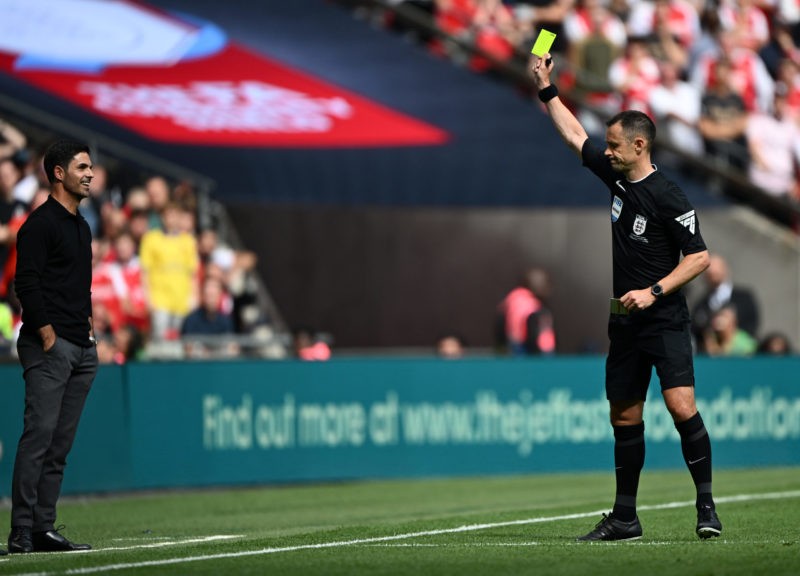The introduction of new rules to curb time-wasting in football has led to an unforeseen consequence: the extension of game times.
While this may seem like a minor adjustment, it has raised concerns among broadcasters who must adhere to strict scheduling.
Consequently, top broadcasting companies are now holding talks with football authorities.
But has there been enough consultation with the players, clubs, managers, or fans who are most affected by these changes?
- The new rules aimed at cutting down time-wasting have led to significant extensions in match durations, impacting the scheduling for broadcasters.
- Broadcasters are actively holding talks with football authorities, with the likes of Sky, ITV, BBC, and Channel 4 involved in discussions.
- There seems to be no record of consultation or engagement with players, clubs, managers, or fans about these rule changes.
Extended game times raise concerns among broadcasters

The recent introduction of rules designed to eliminate time-wasting has caused a ripple effect across the footballing landscape.
Matches are set to carry on for longer this season, a change that already manifested in Arsenal’s equalising goal in the 101st minute against Manchester City at the Community Shield.
Executives at major broadcasters such as Sky, ITV, BBC, and Channel 4 have expressed serious concerns over how this extra time will affect their scheduling.
The impact of these new regulations has prompted discussions with football authorities ahead of the Premier League’s start.
Players, clubs, managers, and fans left out of the loop?
While broadcasters are actively engaging with authorities over these rule changes, it appears that those most directly affected by the game’s flow and rhythm—players, clubs, managers, and fans—have not been included in these talks.
The recent equaliser by Arsenal at Wembley left Manchester City’s boss Pep Guardiola visibly frustrated, and widespread surprise was noted among crowds at EFL and National League matches during matches at the weekend.
Guardiola said, “It’s a good question for the international board and people because they don’t consult with managers and players and we have to accept it with this amount of games.
“Now the games will be 100 minutes. Nothing happened today and there was eight minutes. They extend for goals. If the score is 4-3, you put 45 seconds on for seven goals, 9am tomorrow morning I am (still) here playing.”
Meanwhile, Manchester United’s Raphael Varane took to social media to say, “We had a meeting last week with the FA.
“They recommended from the referees new decisions and rules.
“From the managers and players, we have shared our concerns for many years now that there are too many games, the schedule is overcrowded, and it’s at a dangerous level for players physical and mental well-being.
“Despite our previous feedbacks, they have now recommended for next season: longer games, more intensity, and less emotions to be shown by players.
“We just want to be in good condition on the pitch to give 100% to our club and fans. Why are our opinions not being heard? As a player I feel very privileged to do the job I love every day but I feel these changes are damaging our game.
“We want to be at our maximum level, the best we can be and put on amazing performances for fans to celebrate every week. I believe it is important that we, players and managers, highlight these important issues as we want to protect the game we love and give the fans our best.”
This raises the question: Have the football authorities considered the views and feelings of those on the pitch and in the stands?
Traditional broadcasters more affected
Sources disclose that initial discussions have already taken place, primarily affecting traditional terrestrial broadcasters. These broadcasters have stricter schedule slots, making the extension of game times a more pressing issue for them.
The new rules could lead to unforeseen consequences for both the viewing experience and the game itself. While the intention to reduce time-wasting is commendable, the lack of communication and collaboration with the key stakeholders within the football community raises questions about the approach taken by football authorities.
Conclusion
The ongoing discussions between broadcasters and football authorities reflect a broader issue within the world of football: the importance of open dialogue and consideration of all stakeholders.
While the concerns of broadcasters are valid and must be addressed, the absence of engagement with players, clubs, managers, and fans leaves a void in the decision-making process.
For the integrity and success of the game, it is crucial that all voices are heard, not just those of commercial partners.

